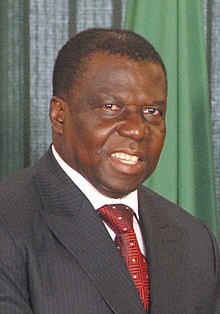João Bernardo Vieira
| João Bernardo Vieira | |
|---|---|
 |
|
| President of Guinea-Bissau | |
|
In office 1 October 2005 – 2 March 2009 |
|
| Prime Minister |
Carlos Gomes Aristides Gomes Martinho Ndafa Kabi Carlos Correia Carlos Gomes |
| Preceded by | Henrique Rosa (Acting) |
| Succeeded by | Raimundo Pereira (Acting) |
|
In office 16 May 1984 – 7 May 1999 |
|
| Preceded by | Carmen Pereira (Acting) |
| Succeeded by | Ansumane Mané |
|
In office 14 November 1980 – 14 May 1984 |
|
| Prime Minister | Victor Saúde Maria |
| Preceded by | Luís de Almeida Cabral |
| Succeeded by | Carmen Pereira (Acting) |
| Prime Minister of Guinea-Bissau | |
|
In office 28 September 1978 – 14 November 1980 |
|
| President | Luís de Almeida Cabral |
| Preceded by | Constantino Teixeira |
| Succeeded by | Victor Saúde Maria |
| Personal details | |
| Born |
27 April 1939 Bissau, Portuguese Guinea |
| Died | 2 March 2009 (aged 69) Bissau, Guinea-Bissau |
| Political party |
PAIGC Independent |
| Spouse(s) | Isabel Vieira |
João Bernardo "Nino" Vieira (Portuguese pronunciation: [ˈʒwɐ̃w bɨɾˈnaɾðu ˈɲinu viˈejɾɐ], 27 April 1939 – 2 March 2009) was the President of Guinea-Bissau from 1980 to 1984, for the second time from 1984 to 1999, and for the third time from 2005 to 2009. After seizing power in 1980, Vieira ruled for 19 years, and he won a multiparty presidential election in 1994. He was ousted at the end of the 1998–1999 civil war and went into exile. He made a political comeback in 2005, winning that year's presidential election. Vieira was killed by soldiers on 2 March 2009, apparently in retaliation for a bomb blast that killed Guinea-Bissau's military chief General Batista Tagme Na Waie. The military officially denied these allegations after Army officials claimed responsibility for Vieira's death.
Vieira described himself as "God's gift" to Guinea-Bissau during his tenure in office.
Vieira was born in Bissau, then a city of Portuguese Guinea. Originally trained as an electrician, he joined the African Party for the Independence of Guinea and Cape Verde (PAIGC) of Amílcar Cabral in 1960 and soon became a key player in the territory's guerrilla war against Portuguese colonial rule.
Vieira was a member of the Papel ethnic group, which comprises approximately 5% of Guinea-Bissau's population. By contrast, most of Guinea-Bissau's army officers, with whom Vieira had a tense relationship throughout his career, are members of the Balanta ethnicity, which dominates the country.
...
Wikipedia
